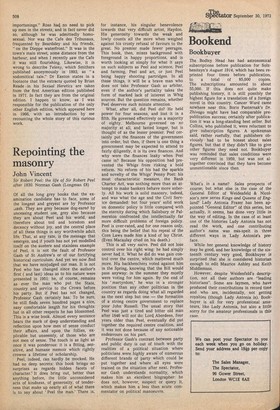Repointing the masonry
John Vincent
Sir Robert Peel: the life of Sir Robert Peel of ter 1830. Norman Gash (Longman E8) Of all the long grey books that the examination candidate has to face, some of the longest and greyest are by Professor ash. They are grey because dog-eared by unceasing student use, grey also because they are about Peel and his world, and therefore about toil and boredom and decency without joy, and the central place of all these things in any worthwhile adult life. That, at any rate, is the message that emerges, and if youth has not yet modelled itself on the austere and stainless example of Peel, it is not the fault of Professor Gash of St Andrew's or of our fortifying historical curriculum. And yet we now find that we have misjudged our man. It is not Peel who has changed since the author's first ( and last) ideas as to his nature were presented in 1951: he, of course, remains as ever the man who put the State, country and service to the Crown before his party. But if Peel has not changed, Professor Gash certainly has. To be sure, he still finds seven hundred pages a nice, easy comfortable length for his thoughts: but in all other respects he has blossomed. This is a wise book. Almost every sentence bears the mark of deep understanding and reflection upon how men of sense conduct their affairs, and upon, the follies, explicable but unseemly, of those who are not men of sense. The touch is as light as once it was ponderous: it is a fitting, sensitive, and humane memoir which rightly crowns a lifetime of scholarship.
Peel, indeed, can hardly be mocked. He had no deep secrets: this book brings no surprises as regards hidden facets of character.' It does bring out, better than anything before, the little unconsidered acts of kindness, of generosity, of tenderness that make up nearly all of what there is to say about ' Peel the man.' There is, for instance, his singular benevolence towards that very difficult artist, Haydon. His generosity towards the weak and lowly counts all the more when weighed against his crusty refusal of favours to the great. No premier made fewer peerages. This book, then, mixes background with foreground in happy proportions, and is worth looking at simply for what it says on such subjects as Peel and science, Peel and farming, Peel and art, or just Peel being happy shooting partridges. In all these things, it will be a brave man who does not take Professor Gash as arbiter, even if the author's partiality takes the form of marked lack of interest in Whig sources. But the question remains, whether Peel deserves such minute attention.
What, after all, did Peel do? He held power for four seasons, and lost it in a fifth. He governed effectively on a majority of eighty. Melbourne governed on no majority at all, and lasted longer, but is thought of as the lesser premier. Peel certainly put the finances of the government into order, but then, if there is one thing a government may be expected to attend to fairly diligently, it is its own finances. And why were the finances leaky when Peel came in? Because his opposition had prevented the Whigs from risking a bold reform. No reform of his had the sparkle and novelty of the Whigs' Penny Post: his most characteristic measure, the Bank Charter Act, was nothing more than an attempt to make bankers behave more soberly. All his work is solid masonry, indeed, and was what the age and the Civil Service demanded: but four years' solid work on domestic policy is little compared with the eternity during which Salisbury or Palmerston confronted the intellectually far more difficult problems of foreign policy. Peel is over-rated, and for one reason only, this being the belief that his repeal of the Corn Laws made him a kind of lay Christ. (Even Macaulay cried on his death.) This is all very naive. Peel did not lose control over his right wing: he had simply never had it. What he did do was gain control over the centre, which mattered much more. His backbenchers voted against him in the Spring, knowing that the Bill would pass anyway: in the summer they mostly were voting for him again. By the end of his 'martyrdom,' he was in a stronger position than any other politician in the country as regards doing what all regarded as the next step but one — the formation of a strong centre government to replace poor John Russell. The usual story that Peel was just a tired and bitter old man after 1846 will not do: Lord Aberdeen, four years older than Peel, eventually did put together the required centre coalition, and it was not done because of any noticeable endeavours on his part.
Professor Gash's contrast between party and public duty is out of touch with the realities of a political situation where politicians were highly aware of numerous different brands of party which could be put together and where all eyes were trained, on the situation after next. Professor Gash understands normality, which makes him an excellent biographer: he does not, however, suspect or query it, which makes him a less than acute commentator on political manoeuvre.










































 Previous page
Previous page